 Erklärung zur Verwendung von Dativ und Akkusativ
Erklärung zur Verwendung von Dativ und Akkusativ
Nomen und
Pronomen haben vier Formen („Kasus“), in denen sie im deutschen Satz stehen können:
Nominativ, Genitiv, Dativ und Akkusativ
Die erste Form heißt „Nominativ“. Sie ist die Form, die im Wörterbuch steht. Zum Beispiel:
„Tisch, der“, „Blume, die“ oder
„Buch, das“
Das bedeutet, dass das Nomen „Tisch“ Maskulinum, das Nomen „Blume“ Femininum und „Buch“ Neutrum ist.
Im Satz ist der
Nominativ IMMER Subjekt. Man fragt mit
„wer? oder „was?“:
Der Tisch wackelt. WER wackelt? – Der Tisch. (Subjekt)
Die Blume duftet. WER duftet? – Die Blume. (Subjekt)
Das Buch ist interessant. WAS ist interessant? – Das Buch. (Subjekt)
Im Satz
gibt es immer nur ein Subjekt*, also nur einen Nominativ. Andere Nomen oder Pronomen sind
Objekte:
Das Mädchen trinkt den Kakao. WER trinkt den Kakao? – Das Mädchen (Subjekt)
- WAS/WEN trinkt das Mädchen? – Den Kakao (Objekt)
Der Arzt hilft dem Patienten. WER hilft dem Patienten? – Der Arzt (Subjekt)
- WEM hilft der Arzt? – Dem Patienten (Objekt)
DER DATIV
Das Verb im Satz definiert das Objekt (Genitiv, Dativ oder Akkusativ).
Die zweite Form, die Nomen oder Pronomen haben können, heißt „Genitiv“. Sie zeigt den Besitz einer Person an und ist heute schon nicht mehr üblich. Normalerweise ersetzt man den Genitiv durch die Präposition „von“ in Kombination mit der dritten Form, dem „Dativ“. Die Dativ-Frage ist „wem?“ und zeigt, dass
Dativ immer** für
eine Person steht.
Der Ball von dem Kind. Von
WEM? – Dem Kind (Objekt im Dativ)
Der Arzt hilft dem Patienten.
WEM hilft der Arzt? – Dem Patienten (Objekt im Dativ)

Wer?
Wem?
Du fehlst mir.
Nominativ Verb +
Dativ
Der Dativ steht nach den Verben:
absagen – Der Manager muss
dem Klienten den Termin absagen.
ähneln – Das Baby ähnelt
dem Vater sehr.
antworten – Bitte antworte
mir schnell!
begegnen – Sind Sie schon
Herrn Müller, dem Chef, begegnet?
befehlen – Der General befiehlt
dem Soldaten still zu stehen.
beistehen – Keine Sorge, ich stehe
dir bei der Operation bei.
beitreten – Möchten Sie
unserer wohltätigen Organisation beitreten?
danken – Ich danke
meiner Familie für das Verständnis.
dienen – Womit kann ich
Ihnen dienen?
drohen – Der Kriminelle hat
dem Millionär gedroht.
einfallen – Zu diesem Thema fällt
dem Autor viel ein.
entgegenkommen – Sag mir, wann du wegfährst. Ich komme
dir auf halbem Weg entgegen.
fehlen –
Frau Meier fehlt ihr entlaufener Hund so sehr.
folgen – Bitte folgen Sie
dem Herrn mit der gelben Fahne in der Hand.
gefallen – Gefällt es
euch hier in Österreich?
gehorchen – Meine Kinder gehorchen
mir überhaupt nicht mehr.
gehören –
Wem gehört das Auto in der Einfahrt?
gelingen – Paul hofft, dass
ihm die Führerscheinprüfung gelingt.
genügen – Danke, das genügt
der Kommission.
glauben – So glaub
mir doch, dass ich die Wahrheit sage!
gratulieren – Tante Sibylle gratuliert
ihrer Oma zum 105. Geburtstag.
gut tun – Ein Urlaub am Meer tut
dem Patienten gut.
helfen – Kann ich
Ihnen helfen?
missfallen – Papa, warum missfällt
dir jeder von meinen Freunden?
misslingen – Oh je, jetzt ist
der Köchin der Kuchen wieder misslungen!
sich nähern – Der Tiger nähert sich
seinem Opfer rasant.
nachlaufen – Die Kinder laufen
dem Ball gerne nach.
nützen – Das nützt
mir doch nichts!
passen – Das Shirt passt
Elsa nicht mehr. Sie ist zu dick geworden.
passieren – Wie konnte
dir das nur passieren?
raten – Der Arzt hat
meinem Opa geraten, ins Krankenhaus zu fahren.
sich schaden – Du schadest
dir, wenn du noch länger rauchst!
schmecken – Schokolade schmeckt
den Kindern besonders gut.
vertrauen – Paula vertraut
ihrer Freundin mehr als
ihrer Mutter.
verzeihen – Verzeihen Sie
mir bitte!
weh tun –
Dem Kind tut der Bauch weh.
ausweichen – Der alkoholisierte Autofahrer konnte
dem Baum nicht mehr ausweichen.
widersprechen – Widersprich
deiner Mutter nicht immer!
zuhören – Die Studenten sollen
dem Lehrer immer zuhören.
DER AKKUSATIV
Die vierte Form von Nomen und Pronomen heißt „Akkusativ“.
90% von allen deutschen Verben brauchen
ein Objekt im Akkusativ! Die Akkusativ-Frage ist „wen?“ oder „was?“.
Das Mädchen trinkt den Kakao.
WAS/WEN trinkt das Mädchen? – Den Kakao (Objekt im Akkusativ)
Tina trifft die Freundin.
WEN/WAS trifft Tina? – Die Freundin (Objekt im Akkusativ)
Nur wenige Verben brauchen zwei Objekte, ein Dativ- und ein Akkusativobjekt:
 Ich schenke dem Kind einen Ball.
Ich schenke dem Kind einen Ball.
Nominativ Dativ
Akkusativ
Dativ UND Akkusativ stehen nach den Verben:
anvertrauen- Rita vertraut ihr Baby ihrer 10jährigen Nichte an.
beantworten- Beantworten Sie mir doch noch eine Frage!
beweisen- Der Verurteilte konnte dem Richter seine Unschuld nicht beweisen.
borgen- Papa, bitte borg mir noch einmal ein bisschen Geld!
bringen- Soll ich dir etwas mitbringen?
empfehlen- Unser Küchenchef empfiehlt dem Gast eine Flasche edlen Rotwein?
entziehen- Der Polizist entzieht dem Alkoholiker die Lizenz zum Autofahren.
erlauben- Mama, erlaubst du mir die Party bei Susi?
erzählen- Erzählen Sie uns doch noch einmal die Geschichte vom Unfall!
geben- Gibst du mir bitte das Salz?
leihen- Leihst du ihm bitte das Buch?
liefern- Liefern Sie uns den Wein auch nach Hause?
mitteilen- Das hätte sie uns aber auch selbst mitteilen können!
rauben- Der Dieb raubte dem Museum ein teures Gemälde.
reichen- Reichst du mir bitte den Zucker?
sagen- Du weißt, du kannst mir alles sagen.
schenken- Schenkst du den Kindern wieder ein Buch?
schicken- Frau Müller schickt Ihnen die Briefe noch heute.
schreiben- Firma Kaufgut hat uns schon lange keinen Brief geschrieben.
senden- Wir können Ihnen das Paket heute nicht mehr senden.
stehlen- Der Hund stiehlt dem Metzger eine Wurst.
überlassen- Gerda hat ihrem Bruder ihr Auto überlassen.
verbieten- Papa, du kannst mir das Rauchen nicht verbieten!
verschweigen- Wie lange hast du uns die Schwangerschaft verschwiegen?
versprechen- Du hast versprochen, deinen Eltern immer die Wahrheit zu sagen.
verweigern- Der Angeklagte hat der Polizei die Aussage verweigert.
wegnehmen- Das Mädchen nimmt ihrer Freundin die Puppe weg.
zeigen- Können Sie mir bitte den Weg zeigen?
zusehen – Kann ich
Ihnen bei der Arbeit zusehen?
zustimmen – Das Volk stimmt
dem Politiker nicht zu.
zuwenden – Kannst du dich
mir bitte zuwenden, wenn ich mit dir spreche?
DIE DEKLINATION
Nomen:
Nomen verändern die Form (=„Deklination“): Es gibt die vier Kasus Nominativ, Akkusativ, Dativ und Genitiv.
Die Deklination sieht man am Artikel. Es gibt den
bestimmten Artikel („der“, „die“,…) und den
unbestimmten Artikel („ein“, „eine“,…).
Der bestimmte Artikel
bezeichnet eine bekannte Sache oder Person:



| Singular |
Maskulinum |
Femininum |
Neutrum |
| Nominativ |
Der Tisch |
Die Blume |
Das Bild |
| Akkusativ |
Den Tisch |
Die Blume |
Das Bild |
| Dativ |
Dem Tisch |
Der Blume |
Dem Bild |
| Genitiv |
Des Tisches |
Der Blume |
Des Bildes |
| Plural |
Maskulinum, Femininum, Neutrum |
| Nominativ |
Die Tische, Blumen, Bilder |
| Akkusativ |
Die Tische, Blumen, Bilder |
| Dativ |
Den Tischen, Blumen, Bildern |
| Genitiv |
Der Tische, Blumen, Bilder |
Der unbestimmte Artikel
meint etwas Unbestimmtes. Die Person oder Sache ist unbekannt oder es ist egal, was gemeint ist.



| Singular |
Maskulinum |
Femininum |
Neutrum |
| Nominativ |
Ein Tisch |
Eine Blume |
Ein Bild |
| Akkusativ |
Einen Tisch |
Eine Blume |
Ein Bild |
| Dativ |
Einem Tisch |
Einer Blume |
Einem Bild |
| Genitiv |
Eines Tisches |
Einer Blume |
Eines Bildes |
Eine Pluralform existiert nicht.
Adjektivdeklination:
Steht VOR dem Nomen ein Adjektiv, so erhält das Adjektiv eine Endung. Adjektivdeklination
Nach bestimmtem Artikel:
| Singular |
Maskulinum |
Femininum |
Neutrum |
| Nominativ |
der/dieser/jener/ welcher/mancher
große Tisch |
die/diese/jene/
welche/manche schöne Blume |
das/dieses/jenes/
welches/manches bunte Bild |
| Akkusativ |
den großen Tisch |
die schöne Blume |
das bunte Bild |
| Dativ |
dem großen Tisch |
der schönen Blume |
dem bunten Bild |
| Genitiv |
des großen Tisches |
der schönen Blume |
des bunten Bildes |
| Plural |
Maskulinum |
Femininum |
Neutrum |
| Nominativ |
die/alle großen Tische |
die/alle schönen Blumen |
die bunten Bilder |
| Akkusativ |
die großen Tische |
die schönen Blumen |
die bunten Bilder |
| Dativ |
den großen Tischen |
den schönen Blumen |
den bunten Bildern |
| Genitiv |
der großen Tische |
der schönen Blumen |
der bunten Bilder |
Nach unbestimmtem Artikel:
| Singular |
Maskulinum |
Femininum |
Neutrum |
| Nominativ |
ein/kein/mein
großer Tisch |
eine/meine/keine
schöne Blume |
ein/mein/kein
buntes Bild |
| Akkusativ |
einen großen Tisch |
eine schöne Blume |
ein buntes Bild |
| Dativ |
einem großen Tisch |
einer schönen Blume |
einem bunten Bild |
| Genitiv |
eines großen Tisches |
einer schönen Blume |
eines bunten Bildes |
| Plural |
Maskulinum |
Femininum |
Neutrum |
| Nominativ |
große Tische |
schöne Blumen |
bunte Bilder |
| Akkusativ |
große Tische |
schöne Blumen |
bunte Bilder |
| Dativ |
großen Tischen |
schönen Blumen |
bunten Bildern |
| Genitiv |
großer Tische |
schöner Blumen |
bunter Bilder |
Nach dem Nullartikel:
| Singular |
Maskulinum |
Femininum |
Neutrum |
| Nominativ |
großer Tisch |
schöne Blume |
buntes Bild |
| Akkusativ |
großen Tisch |
schöne Blume |
buntes Bild |
| Dativ |
großem Tisch |
schöner Blume |
buntem Bild |
| Genitiv |
großen Tisches |
schöner Blume |
bunten Bildes |
| Plural |
Maskulinum |
Femininum |
Neutrum |
| Nominativ |
große Tische |
schöne Blumen |
bunte Bilder |
| Akkusativ |
große Tische |
schöne Blumen |
bunte Bilder |
| Dativ |
großen Tischen |
schönen Blumen |
bunten Bildern |
| Genitiv |
großer Tische |
schöner Blumen |
bunter Bilder |
PRONOMEN:
Deklination – Personalpronomen:
| Singular |
1. Person |
2. Person |
3. Person |
3. Person |
3. Person |
| Nominativ |
ich |
du |
er |
sie |
es |
| Akkusativ |
mich |
dich |
ihn |
sie |
es |
| Dativ |
mir |
dir |
ihm |
ihr |
ihm |
| Genitiv |
meiner |
deiner |
seiner |
ihrer |
seiner |
| Plural |
1. Person |
2. Person |
3. Person |
3. Person |
| Nominativ |
wir |
ihr |
sie |
Sie |
| Akkusativ |
uns |
euch |
sie |
Sie |
| Dativ |
uns |
euch |
ihnen |
Ihnen |
| Genitiv |
unser |
euer |
ihrer |
Ihrer |
Deklination – Possessivpronomen:
Das Possessivpronomen richtet sich nach dem Besitzer:
| Singular |
Personalpronomen |
Possessivpronomen |
| 1. Person |
ich |
mein |
| 2. Person |
du |
dein |
| 3. Person Maskulinum |
er |
sein |
| 3. Person Femininum |
sie |
ihr |
| 3. Person Neutrum |
es |
sein |


Possessivpronomen haben eine Deklination:
| Merke: Die Deklination von „ein“, „kein“ und den Possessivpronomen ist gleich. |
Deklination am Beispiel „mein-“:
| |
Maskulinum |
Neutrum |
Femininum |
Plural |
| Nominativ |
mein |
mein |
meine |
meine |
| Akkusativ |
meinen |
mein |
meine |
meine |
| Dativ |
meinem |
meinem |
meiner |
meinen |
| Genitiv |
meines |
meines |
meiner |
meiner |
Deklination – Demonstrativpronomen:
| |
Maskulinum |
Neutrum |
Femininum |
Plural |
| Nominativ |
dieser |
dieses |
diese |
diese |
| Akkusativ |
diesen |
dieses |
diese |
diese |
| Dativ |
diesem |
diesem |
dieser |
denen |
| Genitiv |
dessen |
dessen |
deren |
deren |
Deklination – Relativpronomen:
| |
Maskulinum |
Neutrum |
Femininum |
Plural |
| Nominativ |
der |
das |
die |
die |
| Akkusativ |
den |
das |
die |
die |
| Dativ |
dem |
dem |
der |
denen |
| Genitiv |
dessen |
dessen |
deren |
deren |
* Eine Ausnahme sind Sätze mit „sein“: Zum Beispiel „Er ist Lehrer.“ (Hier gibt es zwei Mal Nominativ).
** Eine Ausnahme ist zum Beispiel das Verb „montieren“: Der Mechaniker montiert DEM AUTO die Lichter. (Ein Auto ist keine Person.)]]>


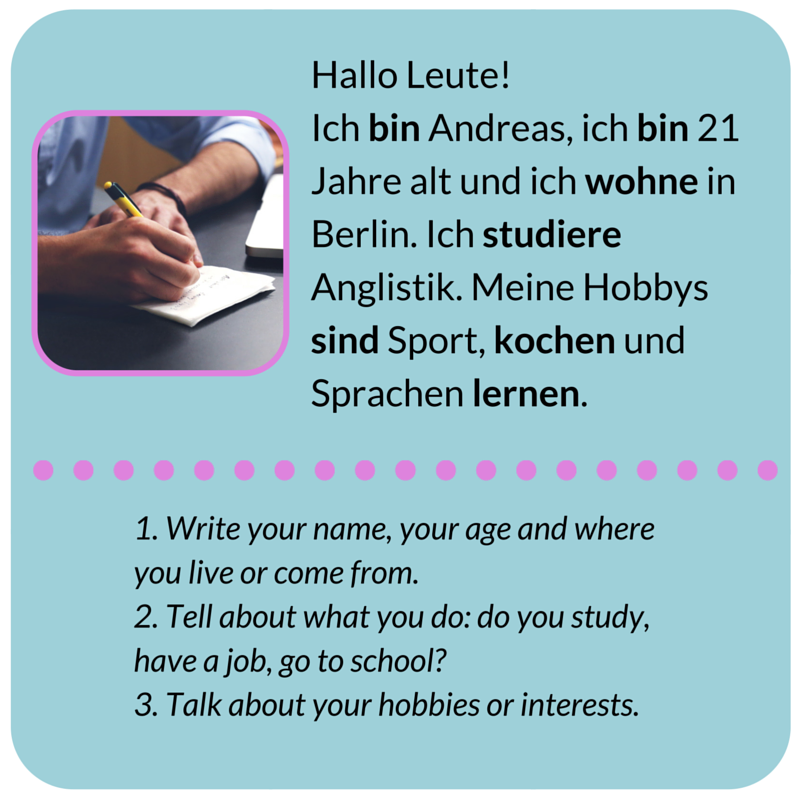 – Hi Guys! Hallo Leute!
– Oral Part – Start Deutsch 1 – Goethe Institut
– Hi Guys! Hallo Leute!
– Oral Part – Start Deutsch 1 – Goethe Institut
 – Introducing Yourself
– Hallo, ich heiße Jenny Schubert. Ich bin 29 Jahre alt und ich komme aus Deutschland. Ich wohne
in Lohmar. Meine Hobbys sind schwimmen, Rad fahren und mit meinen Hunden spazieren gehen.
Ich arbeite als Übersetzerin. Ich spreche Tamil, Telugu, English und ein bisschen Deutsch.
– Können Sie bitte Ihren Namen buchstabieren?
– J – E – N – N – Y
– Und der Nachname: S – C – H – U – B – E – R – T
– Wie ist Ihre Telefonnummer?
– Meine Telefonnummer ist 777 888 999.
– Ich heiße…
– Ich bin…
– Ich heiße Jenny Schubert.
– Ich bin Jenny Schubert.
– Ich bin XX Jahre alt.
– Ich bin 29 Jahre alt.
– Ich komme aus…
– Introducing Yourself
– Hallo, ich heiße Jenny Schubert. Ich bin 29 Jahre alt und ich komme aus Deutschland. Ich wohne
in Lohmar. Meine Hobbys sind schwimmen, Rad fahren und mit meinen Hunden spazieren gehen.
Ich arbeite als Übersetzerin. Ich spreche Tamil, Telugu, English und ein bisschen Deutsch.
– Können Sie bitte Ihren Namen buchstabieren?
– J – E – N – N – Y
– Und der Nachname: S – C – H – U – B – E – R – T
– Wie ist Ihre Telefonnummer?
– Meine Telefonnummer ist 777 888 999.
– Ich heiße…
– Ich bin…
– Ich heiße Jenny Schubert.
– Ich bin Jenny Schubert.
– Ich bin XX Jahre alt.
– Ich bin 29 Jahre alt.
– Ich komme aus…
 – Ich komme aus Deutschland. Ich komme aus Indien. Ich komme aus Schweden. Ich komme aus
Frankreich.
– Die USA
– Ich komme aus den USA. Ich komme aus der Türkei. Ich komme aus der Schweiz.
– Ich arbeite als Sekretärin. Ich arbeite als Ärztin.
– Ich bin Arzt von Beruf. Ich bin Ingenieur von Beruf.
– Ich spreche…
– Ich spreche Deutsch und Englisch.
– Ich spreche Türkisch, Russisch und ein bisschen Deutsch
– Meine Hobbys sind Karate, Tanzen und Schwimmen.
– Ich schwimme gern. Ich tanze gern. Ich fahre gern Fahrrad.
– Meine Hobbys sind…
– Ich wohne in…
– Ich wohne in Berlin. Ich wohne in Madrid. Ich wohne in Chicago.
– Danke schön fürs Zusehen und bisc
– Ich komme aus Deutschland. Ich komme aus Indien. Ich komme aus Schweden. Ich komme aus
Frankreich.
– Die USA
– Ich komme aus den USA. Ich komme aus der Türkei. Ich komme aus der Schweiz.
– Ich arbeite als Sekretärin. Ich arbeite als Ärztin.
– Ich bin Arzt von Beruf. Ich bin Ingenieur von Beruf.
– Ich spreche…
– Ich spreche Deutsch und Englisch.
– Ich spreche Türkisch, Russisch und ein bisschen Deutsch
– Meine Hobbys sind Karate, Tanzen und Schwimmen.
– Ich schwimme gern. Ich tanze gern. Ich fahre gern Fahrrad.
– Meine Hobbys sind…
– Ich wohne in…
– Ich wohne in Berlin. Ich wohne in Madrid. Ich wohne in Chicago.
– Danke schön fürs Zusehen und bisc
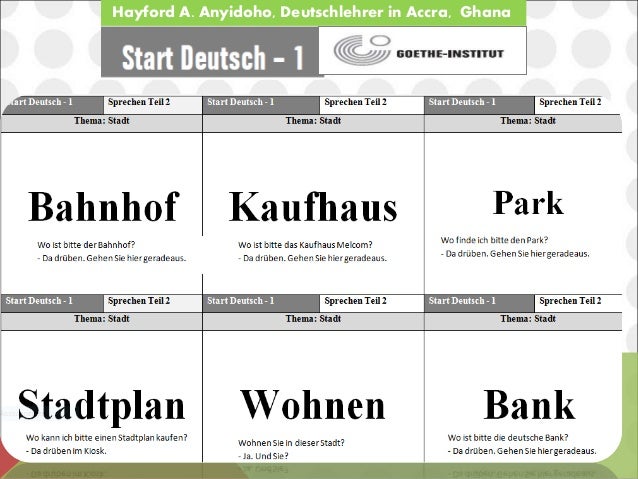
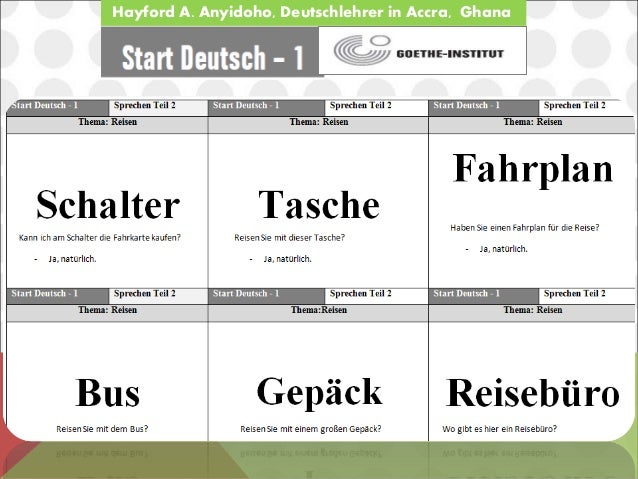


 ]]>
]]>


 Formal Letters
After practicing a few informal letters, they can then practice a formal letter. In business letters, the date is usually written in numbers:
25.3.2010
The student would put his name and address on the top left-hand of the page, and the date on the right. He can also put the address on the right with the date beneath it. The heading would look somewhat like this:
Jan Schwartz
Hauptstrasse 56
92763 Stuttgart
Between the student’s address and the recipient’s address, there should be a few spaces:
Titles used are as follows:
Herrn (Mr)
Frau (Mr./Miss)
Familie (Family)
Herrn Doktor
Herrn Professor
It is usual in business letters to refer to the date of previous correspondence; so following the greeting, the student could begin his formal letter with something like:
Ihr Schreiben vom 15.April 2010
Let the student also practice another way of greeting. This is when the name of the recipient is known;in this case:
Sehr geehrter Herr Müller
Sehr geehrte Frau Weiss
He can also practice the form used when you do not know the person to whom you are writing:
Sehr geehrte Damen und Herren (Dear Sir or Madam)
A few more exercises in formal letters and your students will be well on their way towards receiving student help writing a letter in German, and understanding how to do it.
WE ALSO RECOMMEND…]]>
Formal Letters
After practicing a few informal letters, they can then practice a formal letter. In business letters, the date is usually written in numbers:
25.3.2010
The student would put his name and address on the top left-hand of the page, and the date on the right. He can also put the address on the right with the date beneath it. The heading would look somewhat like this:
Jan Schwartz
Hauptstrasse 56
92763 Stuttgart
Between the student’s address and the recipient’s address, there should be a few spaces:
Titles used are as follows:
Herrn (Mr)
Frau (Mr./Miss)
Familie (Family)
Herrn Doktor
Herrn Professor
It is usual in business letters to refer to the date of previous correspondence; so following the greeting, the student could begin his formal letter with something like:
Ihr Schreiben vom 15.April 2010
Let the student also practice another way of greeting. This is when the name of the recipient is known;in this case:
Sehr geehrter Herr Müller
Sehr geehrte Frau Weiss
He can also practice the form used when you do not know the person to whom you are writing:
Sehr geehrte Damen und Herren (Dear Sir or Madam)
A few more exercises in formal letters and your students will be well on their way towards receiving student help writing a letter in German, and understanding how to do it.
WE ALSO RECOMMEND…]]>
 Wer? Wem?
Du fehlst mir.
Nominativ Verb + Dativ
Der Dativ steht nach den Verben:
absagen – Der Manager muss dem Klienten den Termin absagen.
ähneln – Das Baby ähnelt dem Vater sehr.
antworten – Bitte antworte mir schnell!
begegnen – Sind Sie schon Herrn Müller, dem Chef, begegnet?
befehlen – Der General befiehlt dem Soldaten still zu stehen.
beistehen – Keine Sorge, ich stehe dir bei der Operation bei.
beitreten – Möchten Sie unserer wohltätigen Organisation beitreten?
danken – Ich danke meiner Familie für das Verständnis.
dienen – Womit kann ich Ihnen dienen?
drohen – Der Kriminelle hat dem Millionär gedroht.
einfallen – Zu diesem Thema fällt dem Autor viel ein.
entgegenkommen – Sag mir, wann du wegfährst. Ich komme dir auf halbem Weg entgegen.
fehlen – Frau Meier fehlt ihr entlaufener Hund so sehr.
folgen – Bitte folgen Sie dem Herrn mit der gelben Fahne in der Hand.
gefallen – Gefällt es euch hier in Österreich?
gehorchen – Meine Kinder gehorchen mir überhaupt nicht mehr.
gehören – Wem gehört das Auto in der Einfahrt?
gelingen – Paul hofft, dass ihm die Führerscheinprüfung gelingt.
genügen – Danke, das genügt der Kommission.
glauben – So glaub mir doch, dass ich die Wahrheit sage!
gratulieren – Tante Sibylle gratuliert ihrer Oma zum 105. Geburtstag.
gut tun – Ein Urlaub am Meer tut dem Patienten gut.
helfen – Kann ich Ihnen helfen?
missfallen – Papa, warum missfällt dir jeder von meinen Freunden?
misslingen – Oh je, jetzt ist der Köchin der Kuchen wieder misslungen!
sich nähern – Der Tiger nähert sich seinem Opfer rasant.
nachlaufen – Die Kinder laufen dem Ball gerne nach.
nützen – Das nützt mir doch nichts!
passen – Das Shirt passt Elsa nicht mehr. Sie ist zu dick geworden.
passieren – Wie konnte dir das nur passieren?
raten – Der Arzt hat meinem Opa geraten, ins Krankenhaus zu fahren.
sich schaden – Du schadest dir, wenn du noch länger rauchst!
schmecken – Schokolade schmeckt den Kindern besonders gut.
vertrauen – Paula vertraut ihrer Freundin mehr als ihrer Mutter.
verzeihen – Verzeihen Sie mir bitte!
weh tun – Dem Kind tut der Bauch weh.
ausweichen – Der alkoholisierte Autofahrer konnte dem Baum nicht mehr ausweichen.
widersprechen – Widersprich deiner Mutter nicht immer!
zuhören – Die Studenten sollen dem Lehrer immer zuhören.
Wer? Wem?
Du fehlst mir.
Nominativ Verb + Dativ
Der Dativ steht nach den Verben:
absagen – Der Manager muss dem Klienten den Termin absagen.
ähneln – Das Baby ähnelt dem Vater sehr.
antworten – Bitte antworte mir schnell!
begegnen – Sind Sie schon Herrn Müller, dem Chef, begegnet?
befehlen – Der General befiehlt dem Soldaten still zu stehen.
beistehen – Keine Sorge, ich stehe dir bei der Operation bei.
beitreten – Möchten Sie unserer wohltätigen Organisation beitreten?
danken – Ich danke meiner Familie für das Verständnis.
dienen – Womit kann ich Ihnen dienen?
drohen – Der Kriminelle hat dem Millionär gedroht.
einfallen – Zu diesem Thema fällt dem Autor viel ein.
entgegenkommen – Sag mir, wann du wegfährst. Ich komme dir auf halbem Weg entgegen.
fehlen – Frau Meier fehlt ihr entlaufener Hund so sehr.
folgen – Bitte folgen Sie dem Herrn mit der gelben Fahne in der Hand.
gefallen – Gefällt es euch hier in Österreich?
gehorchen – Meine Kinder gehorchen mir überhaupt nicht mehr.
gehören – Wem gehört das Auto in der Einfahrt?
gelingen – Paul hofft, dass ihm die Führerscheinprüfung gelingt.
genügen – Danke, das genügt der Kommission.
glauben – So glaub mir doch, dass ich die Wahrheit sage!
gratulieren – Tante Sibylle gratuliert ihrer Oma zum 105. Geburtstag.
gut tun – Ein Urlaub am Meer tut dem Patienten gut.
helfen – Kann ich Ihnen helfen?
missfallen – Papa, warum missfällt dir jeder von meinen Freunden?
misslingen – Oh je, jetzt ist der Köchin der Kuchen wieder misslungen!
sich nähern – Der Tiger nähert sich seinem Opfer rasant.
nachlaufen – Die Kinder laufen dem Ball gerne nach.
nützen – Das nützt mir doch nichts!
passen – Das Shirt passt Elsa nicht mehr. Sie ist zu dick geworden.
passieren – Wie konnte dir das nur passieren?
raten – Der Arzt hat meinem Opa geraten, ins Krankenhaus zu fahren.
sich schaden – Du schadest dir, wenn du noch länger rauchst!
schmecken – Schokolade schmeckt den Kindern besonders gut.
vertrauen – Paula vertraut ihrer Freundin mehr als ihrer Mutter.
verzeihen – Verzeihen Sie mir bitte!
weh tun – Dem Kind tut der Bauch weh.
ausweichen – Der alkoholisierte Autofahrer konnte dem Baum nicht mehr ausweichen.
widersprechen – Widersprich deiner Mutter nicht immer!
zuhören – Die Studenten sollen dem Lehrer immer zuhören.
 Ich schenke dem Kind einen Ball.
Nominativ Dativ Akkusativ
Dativ UND Akkusativ stehen nach den Verben:
anvertrauen- Rita vertraut ihr Baby ihrer 10jährigen Nichte an.
beantworten- Beantworten Sie mir doch noch eine Frage!
beweisen- Der Verurteilte konnte dem Richter seine Unschuld nicht beweisen.
borgen- Papa, bitte borg mir noch einmal ein bisschen Geld!
bringen- Soll ich dir etwas mitbringen?
empfehlen- Unser Küchenchef empfiehlt dem Gast eine Flasche edlen Rotwein?
entziehen- Der Polizist entzieht dem Alkoholiker die Lizenz zum Autofahren.
erlauben- Mama, erlaubst du mir die Party bei Susi?
erzählen- Erzählen Sie uns doch noch einmal die Geschichte vom Unfall!
geben- Gibst du mir bitte das Salz?
leihen- Leihst du ihm bitte das Buch?
liefern- Liefern Sie uns den Wein auch nach Hause?
mitteilen- Das hätte sie uns aber auch selbst mitteilen können!
rauben- Der Dieb raubte dem Museum ein teures Gemälde.
reichen- Reichst du mir bitte den Zucker?
sagen- Du weißt, du kannst mir alles sagen.
schenken- Schenkst du den Kindern wieder ein Buch?
schicken- Frau Müller schickt Ihnen die Briefe noch heute.
schreiben- Firma Kaufgut hat uns schon lange keinen Brief geschrieben.
senden- Wir können Ihnen das Paket heute nicht mehr senden.
stehlen- Der Hund stiehlt dem Metzger eine Wurst.
überlassen- Gerda hat ihrem Bruder ihr Auto überlassen.
verbieten- Papa, du kannst mir das Rauchen nicht verbieten!
verschweigen- Wie lange hast du uns die Schwangerschaft verschwiegen?
versprechen- Du hast versprochen, deinen Eltern immer die Wahrheit zu sagen.
verweigern- Der Angeklagte hat der Polizei die Aussage verweigert.
wegnehmen- Das Mädchen nimmt ihrer Freundin die Puppe weg.
zeigen- Können Sie mir bitte den Weg zeigen?
zusehen – Kann ich Ihnen bei der Arbeit zusehen?
zustimmen – Das Volk stimmt dem Politiker nicht zu.
zuwenden – Kannst du dich mir bitte zuwenden, wenn ich mit dir spreche?
DIE DEKLINATION
Nomen:
Nomen verändern die Form (=„Deklination“): Es gibt die vier Kasus Nominativ, Akkusativ, Dativ und Genitiv.
Die Deklination sieht man am Artikel. Es gibt den bestimmten Artikel („der“, „die“,…) und den unbestimmten Artikel („ein“, „eine“,…).
Ich schenke dem Kind einen Ball.
Nominativ Dativ Akkusativ
Dativ UND Akkusativ stehen nach den Verben:
anvertrauen- Rita vertraut ihr Baby ihrer 10jährigen Nichte an.
beantworten- Beantworten Sie mir doch noch eine Frage!
beweisen- Der Verurteilte konnte dem Richter seine Unschuld nicht beweisen.
borgen- Papa, bitte borg mir noch einmal ein bisschen Geld!
bringen- Soll ich dir etwas mitbringen?
empfehlen- Unser Küchenchef empfiehlt dem Gast eine Flasche edlen Rotwein?
entziehen- Der Polizist entzieht dem Alkoholiker die Lizenz zum Autofahren.
erlauben- Mama, erlaubst du mir die Party bei Susi?
erzählen- Erzählen Sie uns doch noch einmal die Geschichte vom Unfall!
geben- Gibst du mir bitte das Salz?
leihen- Leihst du ihm bitte das Buch?
liefern- Liefern Sie uns den Wein auch nach Hause?
mitteilen- Das hätte sie uns aber auch selbst mitteilen können!
rauben- Der Dieb raubte dem Museum ein teures Gemälde.
reichen- Reichst du mir bitte den Zucker?
sagen- Du weißt, du kannst mir alles sagen.
schenken- Schenkst du den Kindern wieder ein Buch?
schicken- Frau Müller schickt Ihnen die Briefe noch heute.
schreiben- Firma Kaufgut hat uns schon lange keinen Brief geschrieben.
senden- Wir können Ihnen das Paket heute nicht mehr senden.
stehlen- Der Hund stiehlt dem Metzger eine Wurst.
überlassen- Gerda hat ihrem Bruder ihr Auto überlassen.
verbieten- Papa, du kannst mir das Rauchen nicht verbieten!
verschweigen- Wie lange hast du uns die Schwangerschaft verschwiegen?
versprechen- Du hast versprochen, deinen Eltern immer die Wahrheit zu sagen.
verweigern- Der Angeklagte hat der Polizei die Aussage verweigert.
wegnehmen- Das Mädchen nimmt ihrer Freundin die Puppe weg.
zeigen- Können Sie mir bitte den Weg zeigen?
zusehen – Kann ich Ihnen bei der Arbeit zusehen?
zustimmen – Das Volk stimmt dem Politiker nicht zu.
zuwenden – Kannst du dich mir bitte zuwenden, wenn ich mit dir spreche?
DIE DEKLINATION
Nomen:
Nomen verändern die Form (=„Deklination“): Es gibt die vier Kasus Nominativ, Akkusativ, Dativ und Genitiv.
Die Deklination sieht man am Artikel. Es gibt den bestimmten Artikel („der“, „die“,…) und den unbestimmten Artikel („ein“, „eine“,…).




















 German word
German word translation
translation
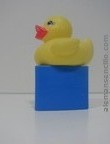

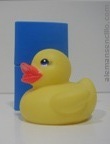
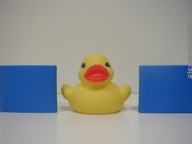


 Hello in German is as easy as saying:
Hello in German is as easy as saying:
 One of the phrases that you will be asked most is what you do. A simple way to answer is:
One of the phrases that you will be asked most is what you do. A simple way to answer is:
 The masculine form:
The masculine form:
